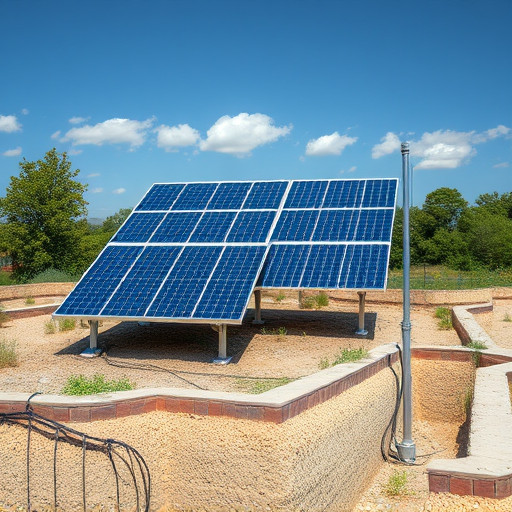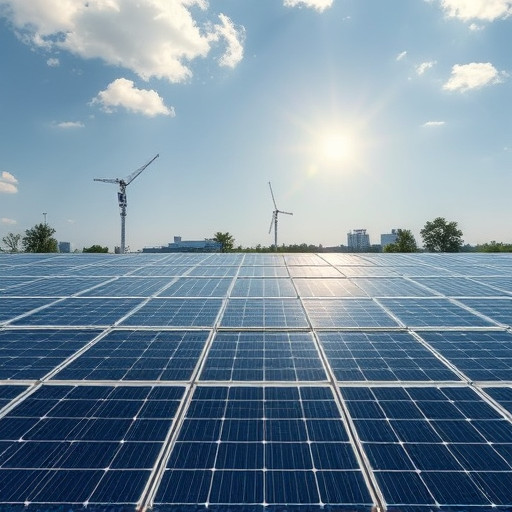The article emphasizes the critical role of advancements in solar energy storage technologies as a cornerstone for sustainable power systems. While solar energy is abundant, its intermittent supply necessitates reliable storage solutions to ensure a steady power source. Current leaders in this field are lithium-ion batteries, praised for their energy density and durability. However, there's a push to explore alternative storage methods like flow batteries, solid-state batteries, and sodium-ion batteries, which promise longer lifespans, better safety, and increased capacity. These innovations aim to store excess solar energy during high production periods, making it available even when sunlight is limited, thus providing a consistent energy supply. As these technologies evolve, their costs are expected to drop, making them more accessible and integral to the renewable energy sector. The integration of smart grid technology with these storage systems further enhances efficiency by optimizing energy use and reducing waste. This progress not only solidifies solar energy's place in the global energy mix but also supports broader environmental sustainability objectives.
Solar energy’s potential to power our future is undeniable. As we harness this clean, renewable resource, the challenge lies in effectively storing solar energy to maximize its use. This article explores innovative storage solutions that enhance energy efficiency and reliability. From advanced battery technologies to strategic integration of cutting-edge systems, the pathway to a sustainable energy grid is paved with these technological advancements. Join us as we delve into the intricacies of solar energy storage, ensuring the sun’s power lights our homes and businesses well beyond sundown.
- Optimizing Solar Energy Storage for Maximized Energy Use: A Deep Dive into Advanced Battery Technologies
- Strategic Solar Energy Storage Solutions: Integrating Cutting-Edge Technologies for Efficient Energy Management
Optimizing Solar Energy Storage for Maximized Energy Use: A Deep Dive into Advanced Battery Technologies

The harnessing and storage of solar energy have become pivotal in the transition towards sustainable power sources. To maximize the utility of solar energy, it is imperative to address the challenges associated with its intermittent nature. Advanced battery technologies play a crucial role in this context by providing efficient and reliable energy storage solutions. Lithium-ion batteries are currently the most prevalent technology for residential and commercial solar systems, offering high energy density and long cycle life. However, research and development efforts are focused on pushing beyond these capabilities to meet the increasing demand for renewable energy storage. Innovations such as flow battery systems, solid-state batteries, and sodium-ion batteries are emerging as viable alternatives that promise longer lifespans, greater safety, and the ability to store more solar energy over extended periods. These technologies not only enhance the capacity to store excess energy generated during peak sunlight hours but also improve the system’s overall efficiency, enabling a consistent power supply even when solar irradiance is low. As the technology matures, costs are expected to decrease, making these advanced storage solutions more accessible and integral to our renewable energy infrastructure. The integration of these cutting-edge battery technologies with solar energy systems is a critical step towards a sustainable energy future, ensuring that the power harnessed from the sun can be effectively captured, stored, and utilized when needed.
Strategic Solar Energy Storage Solutions: Integrating Cutting-Edge Technologies for Efficient Energy Management

In the realm of renewable energy, solar energy stands out as a cornerstone in the transition towards a more sustainable future. As the sun’s rays provide a plentiful source of power, the challenge lies in harnessing and storing this energy efficiently to ensure its availability even when sunlight is not directly accessible. Strategic solar energy storage solutions are pivotal in maximizing the use of this clean resource. Advanced battery technologies, such as lithium-ion and flow batteries, are at the forefront of this integration, offering high capacities and long life cycles. These systems are designed to capture excess solar energy generated during peak sunlight hours and store it for later use, thus smoothing out supply fluctuations and enhancing grid stability. Moreover, the integration of AI-driven algorithms optimizes energy management by predicting demand patterns and adjusting storage output accordingly. This proactive approach not only minimizes waste but also ensures that solar energy is available when it is most needed, thereby significantly contributing to a more resilient and sustainable energy ecosystem.
The evolution of solar energy storage is marked by the continuous development of cutting-edge technologies that promise even greater efficiency and capacity. Innovations such as compressed air energy storage and high-density batteries are being tested and refined for larger scale applications, aiming to provide longer duration energy storage. These advancements are complemented by smart grid technologies that facilitate two-way communication between solar installations and the central grid, allowing for real-time adjustments to energy distribution based on consumption patterns and weather forecasts. The integration of these sophisticated systems is set to revolutionize the way we manage and utilize solar power, making it a more versatile and reliable source of energy that can play a significant role in meeting our global energy needs while reducing our environmental footprint.
In conclusion, the transition to solar energy presents a sustainable and forward-thinking approach to meeting global energy demands. Through the deployment of advanced battery technologies and strategic storage solutions, we can optimize solar energy usage effectively. The integration of these cutting-edge systems is pivotal in enhancing energy management, ensuring a reliable supply that aligns with our clean energy aspirations. As the field advances, the potential for renewable energy to become a dominant force in our power infrastructure becomes increasingly tangible. Embracing these innovative storage solutions will not only contribute to reduced carbon emissions but also position us at the forefront of energy efficiency and environmental stewardship. The future of solar energy is bright, both literally and figuratively, offering a promising path for sustainable development across the globe.
